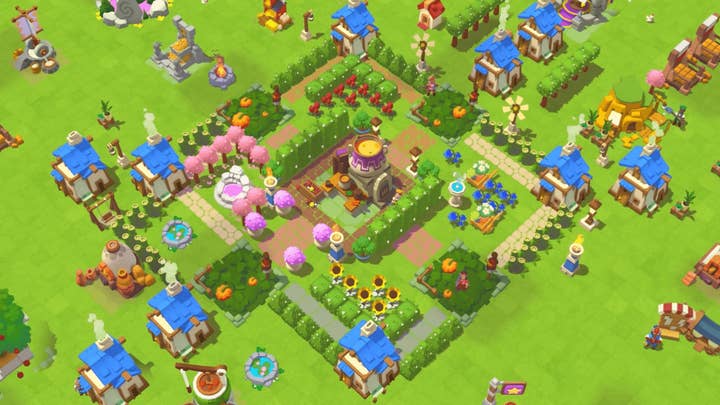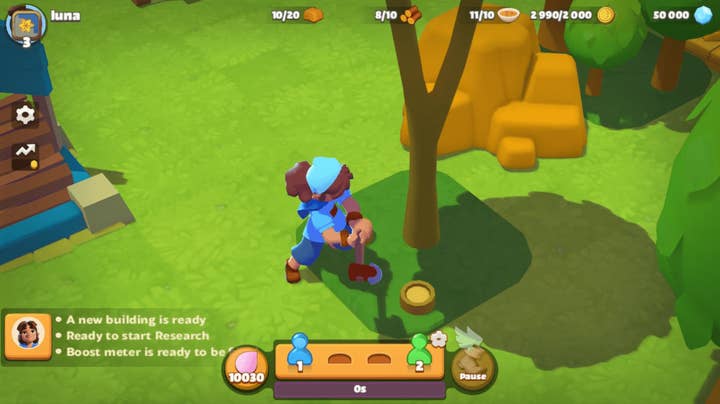Building Everdale, Supercell's "peaceful" multiplayer mobile game
Everdale game lead, game designer and art producer discuss the plans behind studio's first new IP in four years
When it comes to quality and longevity, Supercell holds itself to a high standard.
If a title doesn't meet these standards, it is promptly discontinued, as demonstrated by the shuttering of Rush Wars in 2019 after three months in beta. Hay Day Pop also met a similar fate last year, after eight months.
Today, the Finnish studio launched Everdale, its first new IP since the release of Brawl Stars in 2017. Everdale is a new co-operative builder described as "peaceful, relaxing and filled with enchantment." The game is now available in beta and is free-to-play.
Everdale is set in a calm, social environment, and focuses on working together with players in a non-competitive way to build an area together -- quite the departure from Supercell's conflict-filled games like Clash of Clans and Brawl Stars.
The concept of Everdale came from a single programmer working on the studio's Clash of Clans franchise. They were inspired by the progressive elements of the MMO -- such as world-building, unlocking items and levelling up -- but without the competitive, fighting parts.
The question that followed was "What if it was a builder without the chaos and conflict?"
A basic prototype was made, and a small team shortly formed to work on the project. As Everdale game lead Lasse Seppänen tells GamesIndustry.biz, the project was not planned internally -- a group amassed organically from developers that saw potential in the idea, and eventually received blessing from management to become an "official" team.
"There was no central product management committee saying 'Hey, we need a peaceful game for this audience segment'," Seppänen says. "It started from creativity and inspiration, and if enough talented people are drawn to that project, then it could become an actual project."
Everdale art producer Ken Taya explains how the idea took Clash of Clans and sought to change the heart of it, to focus on a location that is peaceful at its core. The game pulls inspiration from a wealth of areas -- from the world design of Studio Ghibli to the building mechanics of Ubisoft's The Settlers.
"We want to paint this picture of a peaceful, lush valley that's bountiful, that there's abundance of everything, nothing bad happens," Taya tells us. "We got inspiration from low fantasy and folklore, and we wanted to make sure that we painted it with a very peaceful and colourful brush."

Taya also discusses how this new iteration had to be altered from a visual standpoint. A majority of the art assets in Clash are designed to match conflict-focused game mechanics, such as spiky fences and defensive towers.
"Because a lot of the artists have been working on our competitive games, we kind of default into creating these things that look like they're defensible or attack oriented," Taya explains. "We had to really sterilise and wipe down a place, and that was a challenge from the art side. It took quite a while to nail it, to be honest."
"We felt like we wanted it to have a diverse set of offerings for all players," he adds, nodding towards Supercell's recent announcement of three new games into the Clash of Clans series.
"We're very happy that this is not a Clash game or a Clash IP."
"It is really easy for us to sell conflict and war, and we now have to figure out how to sell peace," he adds. "We really struggled with that in some ways from the marketing side, thinking 'how do we do that?'"
"We believe at our core that cooperation and peaceful coexistence is innately attractive. And we hope that our players find that."
The team also discussed the struggles with balancing gameplay, compared to the usual Clash formula. Stefan Engblom, game designer on Everdale, explains the difficulty in finding a balance for the game's mechanics and progression, owing to how slow the gameplay is.
"It is really easy for us to sell conflict and war, and we now have to figure out how to sell peace"
Ken Taya, Supercell
"The game and the meta in a way are one on the same," Engblom explains. "You can't just play a five-minute match, tweak the balance and then play another five minute-match -- you really have to play for a week or two weeks or a month to get the feel. It's slower for sure, to develop and to get it right."
Everdale also relies on teamwork; all of a player's individual work contributes towards a bigger goal, Engblom says that it is basically impossible to play Everdale without the help of others.
"In addition to that, we have co-operation in our game; it's very much at the core. You literally can't play this game without being in a team," Engblom says. "So every player has a village, but then, every village is in a valley that has up to ten villages. You are literally building that valley together, sharing that progress."
Players can also see all of their neighbouring villages in real-time too, which is quite the technological feat, according to Seppänen. Everdale is showing constant progress of players' own villages, their friends' villages, and the central valley which every player is contributing to.
"The valley is actually a separate entity, and each village is a separate entity, and we're real-time patching them into the same world where you can actually see if somebody has assigned a villager to chop wood," Seppänen explains.
"If you're looking at their village at that time, then you will actually see the guy go and start chopping wood, just like the actual player who owns the village would see, which was a challenge technologically.
"It did at one point in development actually cause a lot of headache with how to make sure this works globally. or example, if one player is in Singapore and another one is in Canada, it all works seamlessly."

Supercell is confident that Everdale will meet expectations, despite being a slightly different flavour to the studio's usual output.
"Like every game, some like it, some don't, but I think this game certainly has all kinds of aspects that appeal to different kinds of players," Seppänen says. "Clash of Clans, for example, has players who never fight. They only build their village and harvest their resources a bit in the village."
Taya adds: "It's a different type of game, and we invite the community of different players that we've never necessarily engaged with previously. We invite everybody to this table."
With Everdale now officially announced and in beta, what remains to be seen is how the studio's current audience will respond to such a different type of game, and whether it can drum up enough positive response from players to not succumb to the same fate as some of Supercell's other IPs.
"We do want to think about this long term. When we see the first day metrics, we're not going to jump and make a rash decision based on that," Seppänen says. "It is something that we want to build for the long term, and it's really difficult at this point to put any like date to it.
"Supercell really works in a way where the team makes the decision. And right now, we are in a place where we really, really believe in this game and we believe it has a great shot in beta to be successful and become a big global game."

